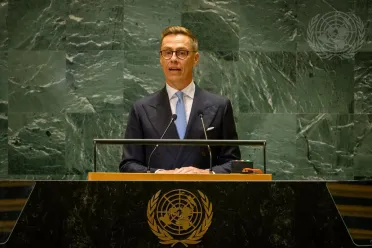Statement
Statement summary
ALEXANDER STUBB, President of Finland, said that his country’s recovery from the Second World War and “our rise from one of the poorest countries in Europe to one of the wealthiest and safest and yes, happiest countries in the world” is closely linked to the success of the United Nations. Noting that the international community is once again standing at a crossroad in history, he noted that the number of ongoing conflicts is the highest since the cold war. “Human suffering has reached a point that should be unacceptable in this room,” he said, adding that paradoxically, many countries are rejecting multilateral cooperation precisely when it is needed more than ever. Highlighting the need for “win-win solutions” rather than “zero-sum games”, he said mitigating and adapting to climate change and halting biodiversity loss is an example of the first. The same goes for technology, he said noting that “all disruptive technologies work in both directions, good and bad”.
More than 10,000 children have been killed in Gaza, he pointed out, adding that child abduction is being used as a weapon of war in Ukraine, and millions of people worldwide have been forced to leave their homes. “Decisions about war and peace are made by a tiny number of people, often driven by a cynical need to hold on to power,” he said, adding that the global majority, who are interested in peace, do not have enough power in the international system. Condemning the Russian Federation’s aggression, he called on President Putin “to end this war and end it now”.
In Palestine, “we must ask ourselves whose interests are driving the war” given that peace meets the interests of Palestinians and Israelis, he said. In Sudan, the international community has failed to apply the principle of African solutions to African problems, he said, adding that it is becoming an arena of regional and international rivalry. Peace mediation cannot be transactional, he stressed, and the United Nations must be at its centre. But without far-reaching reform, he cautioned, the UN will be sidelined.
Highlighting Finland’s three-point proposal for reform, he stressed that all major continents need to be represented in the Council at all times. It is unacceptable that there is no permanent representation from Latin America and Africa, while China alone represents Asia in the 15‑member body. Therefore, the number of permanent members must be increased by five so that there are two from Asia, two from Africa and one from Latin America. Further, no single State should have veto power, he said, noting how it has incapacitated the Council and halted decision-making. “UN agencies are not subject to vetoes and are working effectively, precisely because no single member can prevent them from doing so,” he pointed out. Finally, if a Council member, whether permanent or temporary, violates the UN Charter, its voting rights should be suspended, he said, adding that this decision should ultimately be taken by the General Assembly. Citing his mentor and friend, former Finland President and Nobel Peace Prize laureate Martti Ahtisaari, he said: “Peace is a question of will.”

